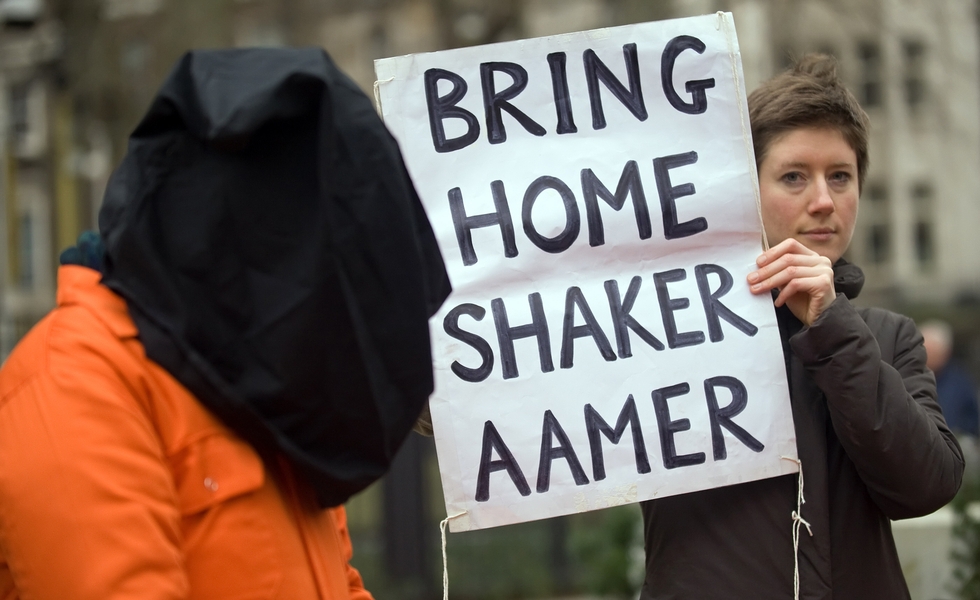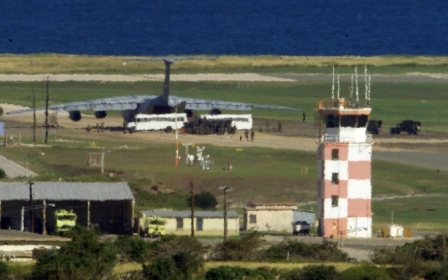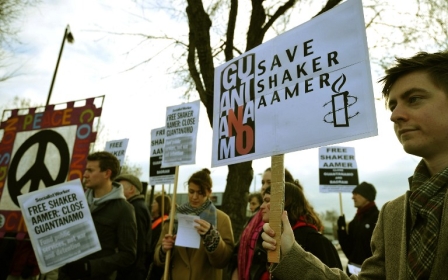Shaker Aamer: The prisoner they’re too ashamed to release

How does a man whose release has apparently been ordered and sought by two successive US presidents and three British prime ministers remain imprisoned without charge or trial by the world’s most vociferous proponent of freedom, in the world’s most notorious prison, for almost 14 years?
Shaker Aamer hailed from the historic holy city of Madinah, Saudi Arabia, and had, like many young men from the Gulf, travelled the Western world. During the mid-90s he decided to settle in London where he met his British wife. In Saudi he had worked as a translator during the First Gulf war; in Britain he did the same job for various legal firms. That is how he supported his family, which included three young children by 2001. He was soon granted permanent UK residency and he developed a reputation as an amicable, popular and helpful character – especially among the refugees he worked with in the local community.
During the spring of 2001 he travelled to Afghanistan with his family to work on a charitable project to build schools and wells. Following the 9/11 attacks and the subsequent US-led bombing campaign, Aamer like hundreds of others fleeing the fighting, was captured by Afghan villagers seeking bounty money offered by the Americans and handed over to US military custody.
Aamer was among the first groups of prisoners to be seen kneeling, dressed in orange, hooded and shackled, in shocking images that emerged from the US military detention camp in Guantanamo Bay, Cuba, at the beginning of 2002. He has been there ever since. Aamer’s youngest son Faris was born shortly after he was captured. The two have never met.
Torture in Bagram
Before arriving in Cuba, Aamer had been held in numerous US military camps in Afghanistan, including the infamous Bagram air base prison. What he witnessed and endured there forms, in my view, two key factors preventing his release: First, Aamer explained to his lawyers that during one of countless interrogation sessions his head was repeatedly smashed against a wall while British MI6 agents watched and questioned him.
This was in addition to the sleep and food deprivation, beatings, stress positions and religious abuse all the prisoners complained of. Second, and perhaps most damning, he witnessed the torture of Ibn al-Sheikh al-Libi as he was transported alive in a coffin from Bagram.
Al-Libi had erroneously been classified by US intelligence as a senior al-Qaeda member in 2002. He was sent to Egypt where he was tortured by President Mubarak’s intelligence chief Omar Suleiman into giving a false confession that al-Qaeda was working with Saddam Hussain on obtaining weapons of mass destruction. This information was used by the US as credible evidence at the UN Security Council in 2003 in arguing the case for war against Iraq.
At a time when Britain has been repeatedly implicated in torture complicity prompting a government inquiry and an unprecedented criminal investigation of the security services actions coupled with growing frustration for failure to disclose the findings of the Iraq Chilcot Inquiry, Shaker Aamer’s unfettered testimony could prove fatal.
Advocate for justice
During his 13-year stretch in Guantanamo, Aamer has become a powerful and respected advocate for the rights of prisoners, earning for himself the title “the professor” by some guards. He has led numerous hunger strikes to protest the desecration of the Quran and the abuse of prisoners and fought for better living conditions. This has often led to direct confrontation with the authorities that retaliated at various times with long bouts in solitary confinement and brutal force-feeding techniques in attempts to break the hunger strikes. For other prisoners though, the Americans had unwittingly turned Aamer into a hero.
Former Guanatanamo commander, Colonel Mike Bumgarner, seeking Shaker’s assistance to negotiate an end to the 2005 hunger strikes, said: “He was treated like a rock star, some of the places we would go in. I have never seen grown men - with beards, hardened men - crying at the sight of another man. It was like I was with Bon Jovi or something.”
During that year three hunger-striking prisoners died of asphyxiation. US officials described the alleged suicides as “asymmetrical warfare” and a “PR move”. Others, including former US soldiers who were present, say something far more sinister happened and that Aamer is a witness.
The campaign for Aamer has gained moment over recent years. A 2013 petition topped 117,000 signatories calling for his release. His supporters include Boris Johnson and Jeremy Corbyn amongst a host of others. He has had support from the traditional left-wing press right through to a campaign by the Daily Mail on his behalf.
'Rule of law' only for some
The hypocrisy in Aamer’s case has been noted by diverse and seasoned British politicians who note not only the magnitude of the injustice he has endured but the adverse effect of his case on Muslims being preached to about the British value of the “rule of law’:
“If such treatment were to be carried out by a foreign government, President Obama would be the first to denounce it,” commented Labour MP Gerald Kaufman MP, while Conservative MP Andrew Mitchell said: “Muslims look at this particular case and think that certain rules apply to some people, but not others.”
In January, David Cameron personally raised Shaker’s plight with President Obama, who promised that he would prioritise the case. However, when it was revealed this month that the Pentagon was blocking Aamer’s release, his lawyer Clive Stafford Smith noted: “Obama, it seems, has personally ordered Aamer’s release, and his subordinates have ignored and thwarted his order.” It’s as if Obama wasn’t the president.
Senior Taliban ministers and associates of Osama bin Laden have been freed from Guantanamo - along with 667 others. Prisoners prosecuted under the illegal military commissions process are free. Aamer has never even been designated for trial. Rather, he has been cleared for release – twice.
The only possible conclusion for the refusal to release Shaker Aamer is in the statement of Conservative MP David Davis:
“Shaker has been a representative [of prisoners] in the disputes in Guantanamo, which may make him more of a target. In addition to his own torture, he is said to have witnessed the torture of others, which may be why his release is being withheld… because he would embarrass them, that represents a doubling up of the guilt on their part. Frankly, this will come out into the open at some point.”
Meanwhile, in a message dictated to his lawyer Aamer wrote: “No matter who we are, we must bear in mind what we are fighting for. To me, it is worth suffering for that goal, and I will continue my personal struggle... I am deeply grateful to those in Britain and the US who support us...Our prophet teaches us that if we do not thank others, we do not thank our God.”
Aamer won’t only embarrass leaders when he’s free; his words have already shamed them.
- Moazzam Begg is a former Guantanamo Bay detainee and currently the director of outreach for UK-based campaigning organisation CAGE.
The views expressed in this article belong to the author and do not necessarily reflect the editorial policy of Middle East Eye.
Photo: A protestor holds up a sign calling for the release of Shaker Aamer from the Guantanamo prison during a demonstration in central London, on 11 January, 2010
Middle East Eye propose une couverture et une analyse indépendantes et incomparables du Moyen-Orient, de l’Afrique du Nord et d’autres régions du monde. Pour en savoir plus sur la reprise de ce contenu et les frais qui s’appliquent, veuillez remplir ce formulaire [en anglais]. Pour en savoir plus sur MEE, cliquez ici [en anglais].




